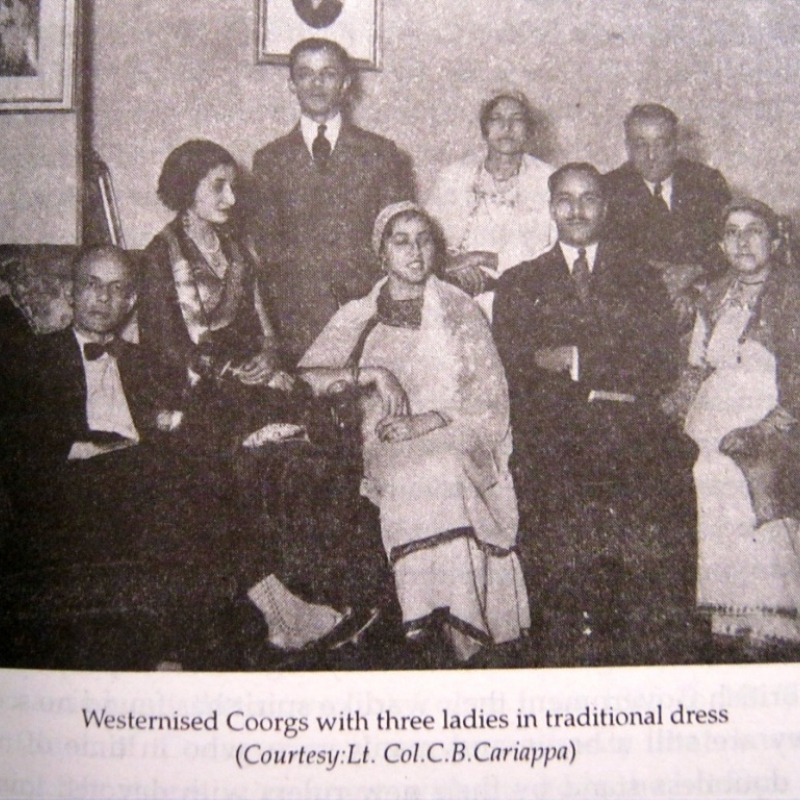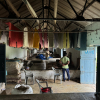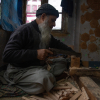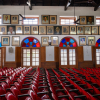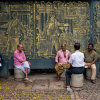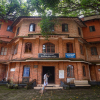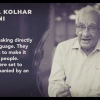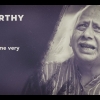HARADAS APPACHA and KODAGU’S NATIONALISM
To situate a play or a playwright in a political and sociological context necessitates an enquiry into the sociopolitical conditions of the period, in order to provide clues as to the influences and circumstances that colored the content and style of playwriting. This article aims to locate Haradas Appacha in the sociopolitical conditions of the period in an attempt to find relevant connections that might have influenced his playwriting.
A CRITICAL JUNCTURE
Haradas Appacha’s period happens to be a highly critical one in Indian history. The period between 1865 and 1944 almost envelops the entire era of nationalism that the country witnessed with enthusiasm. From the annexation of Kodagu by the British in 1834 to the point of Indian independence in 1947, Haradas Appacha was an observer of the turbulent events that unfolded in Indian history in the colonial period. He was born into a country that was already seething with ideas of nationalism and freedom, which later got catapulted into a full scale movement that ultimately secured independence for the country. So, it is natural to expect a writer of his caliber to contribute substantially to the nationalist movement as did many playwrights of Karnataka and elsewhere during that time. Whether Appacha with his literary contributions during the national movement was a passive observer or an active revolutionary, demands detailed investigation.
Appacha’s name has not appeared as a prominent personality in the national scenario as having any importance. In fact, it is rather deplorable that his name does not appear anywhere in a reading of Indian literary or cultural history. Even the famous “Oxford Companion to Indian Theatre” does not have any mention of the greatest playwright Kodagu has ever produced. While it is important to explore the reasons for the absence of the same, what becomes quite evident is that Haradas Appacha did not feature in the long list of names that adorned the halls of fame of the Indian nationalist movement.
Several plays that were composed in this period had puranas as their central theme. These were Samsa’s Suguna Gambhira (1922) and B.M. Shrikantayya’s Gadayuddha Natakam (1926) and Ashwathaman (1926). Stories from puranas were used as an inspiration from and for the ongoing national movement, by bringing down the great characters from their epochal pedestal into the everyday lives of the people, nudging them to not disregard their age old traditions and customs due to of foreign influences and this aspect is in abundant evidence in the works of Appacha in this period.
The British rule in Kodagu is a very interesting study since Kodagu was one of the few territories that welcomed the British rule. This was because of the usual tactic the British used -to claim that the rulers were ‘despotic, debauched, repressive and inefficient[1]’. Moreover, Chikka Veera Rajendra, the last king who ruled over Kodagu, alienated himself from his Dewans and Ministers as a result of which the disgruntled officers entreated the ‘white man’ to depose the unpopular Raja. Under the British rule, the citizens of Kodagu experienced for the first time a new sense of liberty and freedom that was impossible during the reign of the despotic king. ‘The British officers noticed that the people were quite appreciative of the changed order and found them to be keen on improving their standard of living.’[2] With such new found independence, Kodavas looked upon the British as their saviors. The affiliation was so strong that the Kodavas even volunteered to fight for the British against the Sepoy Mutiny, which had engulfed the northern parts of the country. This demonstration of loyalty was recognized by the British and Mark Cubbon, the Chief Commissioner of Mysore and Kodagu, issued a notification in February 1861 exempting the Kodavas from the Disarming Act which continued even after independence whereby Kodavas and some other communities in Kodagu who owned land since the time of the Rajas were exempted from section 3 and 4 of the Indian Arms Act of 1959. While they sided with the British to gain independence from the oppressive regime of the Haleri rajas, the interjection of Nationalism plunged the people of Kodagu into a state of dilemma.
To understand how Appacha functioned as a playwright in such a critical period in history, one must look at the historical and socio-political conditions and events that he was being associated with. In all his four works, the dominant themes are: an address of modernity as a result of the advent of western democratic ideas like social reforms, equality of sexes, scientific and technological progress, opposition to superstitions and conventions, a glorious historical backdrop to the Kodava race, and an emphasis on the dangers of forgetting cultural and ethnic values. There does not seem to be many traces of an openly strong feeling of nationalism that he wished the people of Kodagu to imbibe.
Delving into the circumstances in which Appacha writes, with Kodagu having an ambiguous stand on nationalism, it seems that the playwright found it difficult to express his ideals on nationalism, if he had any. But, what remains true is that Haradas Appacha whose literary output does not seem to give him much credit for any nationalistic fervor, vanished into the silent pages of history, unknown to the canonical realm of contemporary theatre and performance.
So why did Appacha not voice his opinions even though he was equipped quite strongly with the might of his literary talent? I.M. Muthanna, an extremely prolific writer, in his work inspires his countrymen to perform and produce more outputs in all walks of life and in the process. He tries to get across the point that the British rule only brought more good to the country than bad.
‘I said in my publication of 1969 that if the British had not come in those days to unite or unify our utterly chaotic country of the 18th century and check the flow of the Hindu blood as a result of Islamic onslaught of many centuries, and had they not revived our religious, cultural and literary glory, things would have gone on quite differently with some thousands of mini-balkanized states over the entire body of the sub continent and obviously riled by some hundreds of mutually feuding and fighting mini-Nawabs!’ [3]
Indeed Muthanna has made it very clear that the British did not rule the country all too unjustly as people blatantly accuse. If that was not enough, B.D. Ganapathy (1920-1997) another great writer of Kodagu, also mentions thus: ‘The prime reason for Kodagu to have been annexed in 1834 and subsequently ruled by them was the Kodavas themselves, with them applauding the British reign and the British keeping them in good faith.’ [4]
All these accounts point to the fact that the British were favoured by the Kodavas and they did not mind their colonization or the domination so much, as long as their living conditions were sufficiently comfortable. Haradas Appacha, emerging in such a situation as a lone soldier with only his pen as his weapon during his period, did not articulate any explicit ideas on nationalism in his literary outputs.
An interesting fact that arouses curiosity is that after Appacha composed his Yayati Nataka in 1906 and Savitri Nataka and Subramanya Nataka in 1908, both plays that offer a strong critique of the changing social values of the Kodavas as a result of foreign influence, as was a theme that was chosen by many Kannada playwrights of the period, there was a gap of ten years before his last work Kavery Nataka, published in the year 1919. Appacha was constantly serving as a watchdog of Kodava culture, speaking out against an impending total washout of Kodava tradition. For example, when Devayani meets Sharmishtha, they greet each other with a ‘shake hand’; the sakhi of Sharmishtha describes in detail the modernized Kodava woman. Through the words of the sakhi Appacha shares the concerns regarding the new casual modes of fashionable expressions and excessive use of English words in conversation by the new generation, with scant regard to the ‘respectful’ manners of the older generations. She says that these ‘modern’ Kodava women, dress themselves up in ‘boots’ and ‘shoes’ and say (in English) to the smart men that come by, ‘How are you getting on, friend dear?’, greeting them with a ‘shake hand’.
In this backdrop, it is interesting that he chose, ten years later, to write a play that provided a glorious backdrop that valorized the Kodavas as a royal race and did not wield his pen in the direction of anything that sparked nationalism in Kodagu which was slowly simmering in that juncture in history. Again, Haradas Appacha does not seem to celebrate war-like virtues. In the context of the freedom struggle, India’s patriotism was sometimes depicted by many writers in the form of its military heroes like Bankim Chandra’s Anand Mutt and Jayashankar Prasad’s Samudra Gupt.
There is however an interesting little story that seems to be the only one in which Haradasa has raised a feeble voice on the political condition of Kodagu. The play was called Mudduraja, staged on the occasion of the farewell of one of the commissioners of Kodagu, Harris. Excerpts from the play show two characters, one a king and the other his mitra/friend, where the former praises the rule of the British while the latter voices concerns on foreign rule. Even in this episode, the poet’s ambivalent nature on nationalistic ideas comes through. Through the voice of the friend the poet asks a very pertinent question that has perhaps been on the minds of many Kodavas: Why would a bunch of people come all the way across the oceans and rule our country ‘justly’? In these words is evident the poet’s fear of an impending doom. But, through the voice of the King, he lays these doubts at rest, probably due to the fear of the gathering of white men, and the need to impress them which he does by invoking the righteousness of King Edward, Minto and Harris. But in the end, one cannot fail to notice a deep hesitation or ambivalence that stands out in this play[5].
EXPLORING THE AMBIVALENCE
One of the clues for this hesitation lies in his autobiography where he mentions the problems he had with securing the patronage to help him get his works published. Haradas Appacha, though equipped with immense talent, did not have the necessary means to get his works published. In his autobiography he mentions the perils he underwent to make ends meet. In context of Yayati Nataka, his first play, he writes,
‘I presented the idea of printing the play on the occasion of the wedding ceremony of a rich person’s daughter. A few members from the gathering made me recite a few verses from the play and were very pleased with my rendering and in 1906 the first copies were printed.’ [6]
Once printed, there was also the responsibility or a passion for seeing the play being performed. This wasn’t an easy task either. He mentions how in the absence of professional actors or the salary to afford them, Appacha staged the Yayati play with a few students from Madikeri high school. They collected make shift blouses that were donated by the king of Kodagu to several people. They even procured curtains from neighbouring houses and performed the play on a low budget. He also mentions how he staged plays on occasions such as weddings of rich people and travelled with his little troupe as much as he could from Madikeri to Dakshina Kannada’s Thirpu temple and from there to Kakotuparamnu, Murnad, Napoklu till the rains began and he had to return to Madikeri. The problem of finances plagued him throughout his life. He writes,
‘I ran into a lot of debts, trying to make ends meet. The daily allowance for the actors, the stage equipments and tents procured on rent etc proved to be way too expensive. Although the tents filled up with people, the collection was not enough to take care of the expenses of a day. When performed in cities outside of Kodagu, non-Kodavas did not participate and hence resulted in poor collections. In trying to keep my actors happy and in clearing my already existing debts, I ended up with more debts and poverty.” [7]
For this he had to depend on the patronage of the affluent Kodavas of the period. In the introduction to all his plays he mentions the great support offered by his patrons who were highly well-to-do Kodavas who had acquired wealth, education and status by taking maximum benefits of the English education system and were highly placed. It must also be noted that this affluent upper class of Kodavas in general favored the British rule. Therefore, Appacha must have realized that if he needed his works to be published, the content of his works must not be displeasing to his patrons stand probably why he steered clear of any kind of nationalist ideas that would present the colonial rule in an unfavourable light and possibly anger his prospective patrons.
The fear of the loss of patronage is in itself a discouragement. But this was not the only fear that Appacha anticipated. Kodagu was still in a state of ambivalence as to whether or not to withdraw their support for the gallant British that had ameliorated the standard of living of the Kodavas to such an extent that they glorified Kodagu under the British regime as [8]‘Rama Rajya’. Haradas Appacha, already struggling to make ends meet, seems to have chosen to be wary of the dangerously tumultuous situation in Kodagu. Things worsened for the poet when in 1926, his house accidentally caught fire and he lost most of his possessions in the blazing fire and he was reduced to a pauper. He writes:
‘On the 27th of April, 1926, at about 9 in the night, some miscreants set fire to my house and reduced it to ashes. Everything that I had earned in the last 60 years of my life, being the only son of my father, was destroyed. I will never be able to account for the unique and rare things and documents that were consumed by that fire! The money I had kept safe in case of an emergency had also been destroyed. I felt like killing myself, but my third son held me back and fortunately or unfortunately, I am alive today.’ [9]
His words show the levels of desperation that he had descended to in order to merely survive. In such a situation, having lost even the reserve money that he had stored for emergencies, he retired from performing with his troupe, travelling from place to place as it proved to be too expensive. It is known that by 1927, Appacha had retired from playwriting and had begun composing and performing Harikathas. During the next two years he toured Kodagu, Puttur, Mangalore etc performing Harikathas. The mention of his Harikatha performance appears in a newspaper in Mangalore. One of the newspapers carried this news with the headline, [10] “Kodagu’s Haridas (sic) in Mangalore”. One would imagine that for Appacha, having suddenly got such a high recognition as being called the ‘Shakespeare of Kodagu’ would have inspired him to perform more Harikathas. At this juncture in the history of Kodagu, in 1929, a Harikatha Vidwan, one Belur Keshavdas was externed (sic) from Kodagu for staging Harikatha programmes to infuse patriotic feelings among the people[11]‘. This incident must have strengthened the poet’s conviction of not taking a clear stand on nationalism.
It is clear from the records that Appacha had stopped performing after 1929. Even in his autobiography, there is no record of any other performances that he staged anywhere after 1929. He spent the rest of his years trying desperately to get his Yayati Nataka and Kavery Nataka reprinted which he managed to after much difficulty and suffering. By that time, his hearing was impaired and his health began deteriorating completely. His autobiography in 1936 was the last thing he wrote before his gradually deteriorating health claimed his life on 21st November 1944.
It seems reasonable to believe that as a result of the interjection between nationalism and colonialism, Appacha imbibed upon himself all the influences that were being thrust upon the people during that time and consistently reproduced them in his plays. But also evident is the fact on the topic of nationalism and patriotism for the country, Appacha deliberately maintained rather a deafening silence for fear of loss of a livelihood that he had so carefully nurtured with only the might of his pen.
[1] C.P. Belliappa, Nuggets from Coorg History, (New Delhi: Rupa & Co.,2008), 127.
[2] Ibid 125
[3] I.M. Muthanna, Karnataka History Administration and Culture, (Bangalore: s.n. 1977), 388, ix.
[4] I.M. Dhanu, Bachimada D. Ganapathy (Madikeri: Karnataka Kodava Sahitya Academy, 2002), 40.
[5] I. M. Muthanna, Kodagina Haradasa Appacha Kaviya Nalku Natakagalu, (Madikeri: Karnataka Kodava Sahitya Academy,2011), 144-149.
[6]Haradas Appacha, Atmacharitre, a condensed version of his autobiography, quoted in I.M.Muthanna Koḍagina Haradāsa Appacca kaviya Śrī Kāvēri nāṭaka (India:s.n, 1967)
[7] Ibid
[8] Vijay Poonacha Thambanda, Conflicting Identities in Karnataka: Separate State and Anti-separate State Movements in Coorg, (Hampi:Prasaranga,2004), 3.
[9] Haradas Appacha, Atmacharitre, a condensed version of his autobiography, quoted in I.M.Muthanna Koḍagina Haradāsa Appacca kaviya Śrī Kāvēri nāṭaka (India:s.n, 1967)
[10] Ibid
“As Shakespeare is to English literature, so is Haradas Appacha to us. He performed the ‘Shivaratri Rahasya’ Harikathe very entertainingly. Even in his old age, he impressed the men gathering immensely with his clever words, talent, skill and musical expertise. Thereafter Mr. Mangeshrai greatly praised Haradasa’s talent. Born in Kodagu and composing literatre in Kodava language, he has proved to the world that the Kodava language has immense poetic potential. It is impossible to describe his miraculous talents in words. He is, indeed, a ‘Haradasa’”
[11] P.T. Bopanna, Rise and Fall of the Coorg Stage: Kodagu’s Loss, Karnataka’s Gain, (Bangalore: Rolling Stone Publications, 2009), 60.
